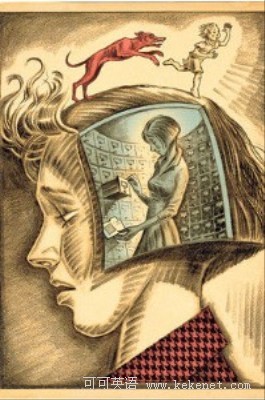(单词翻译:单击)
Is it possible to permanently change your memories? A group of scientists think so. And their new techniques for altering memories are raising possibilities of one day treating people who suffer from phobias, post-traumatic stress disorder and other anxiety-related conditions.
记忆有可能永久改变吗?有一个科研团队认为可以。他们新开发的记忆改变技术也许在将来的某一天可以治愈那些备受恐惧症、创伤后心理紊乱以及其他焦虑症困扰的人们。

Some researchers are working with combat veterans, car-accident survivors and rape victims to replace their memories with less fear-filled ones using a familiar hypertension drug. Other scientists are studying whether behavioral therapy can one day be used to modify memories of people who react with fear to common anxiety-producing events. A person bitten by a dog as a child, for instance, might be able to overcome a canine phobia if the old memory can be replaced with a less scary one.
这个团队中,部分研究者利用一种大家所熟知的高血压药物将退伍军人、车祸幸存者、强奸受害人脑中的可怕记忆替换成相对不那么恐怖的内容。其他科研人员则在研究行为疗法是否可以修正某些人的记忆,这些人会因日常生活中一些习以为常的事件产生恐惧情绪。比如,一个人在小时候被狗咬过,假使能将他这段记忆换成相对不那么可怕的事情,也许就可以帮助他克服犬恐惧症。

The goal of the research isn't to erase memory outright, as depicted in popular movies over the years. That would raise ethical issues and questions of what would happen to associated memories, scientists say. Instead, 'reducing or eliminating the fear accompanying the memory . . . that would be the ideal scenario,' says Roger Pitman, a psychiatry professor at Harvard Medical School who has done extensive work in this area.
这项研究的目的不是像近年很多热门电影里描述的那样直接将不好的记忆消除。科学家们表示,这样做会引发论理上的争议,而且相关记忆会发生怎样的变化也尚不明确。哈佛医学院精神病学教授罗杰•皮特曼(Roger Pitman)在这一领域开展过广泛的研究,他表示,其实,“弱化甚而消除伴随着这一记忆的那种恐惧感……会是理想的解决之道。”

The latest research is based on a radical rethinking of how memories are stored in the brain. Scientists used to believe memories are like snapshots on which the details are fixed once they're recorded. Now, many experts accept the view that memories are stored like individual files on a shelf; each time they are pulled down for viewing, they can be altered before being put back into storage. Altering a memory during the time it is off the shelf can create an updated memory that can be saved in place of the old one, scientists believe.
近来学术界对于大脑存储记忆的方式有了彻底的反思,最近的这项研究也就应运而生了。过去,科学家们认为,记忆像相机快照一样,一旦被大脑所记录,其中的细节便已确定。如今,许多专家都认可,记忆就像是存放在架子上的一个个文档,每次从架子上拿下来看过,再放回去时,记忆也许就已经发生变化了。科学家们认为,在记忆拿下架子的时候对其加以改变,就会产生新的记忆,旧的记忆便被取而代之。

Sometimes a traumatic incident can trigger an enduring response of fear whenever the incident is recalled, even indirectly. A car backfiring, for instance, can set off an emotional response in a combat veteran if the loud noise becomes associated in his mind with a wartime experience.
有些时候,只要大脑中回忆起创伤性事件,即便是间接的回忆,也会引发人体持久的恐惧反应。比如,汽车爆胎会让退伍老兵产生情绪化的反应,只要他的脑子将这声巨响同战争中的某次经历联系在了一起。

A common therapy currently for trauma and phobias is called exposure treatment. It involves repetitive exposure in a nonthreatening way to help patients confront their fears and gradually weaken the fear response, a process known as extinction. But with extinction, the fearful memories don't disappear or get altered, and relapse is common, says Edna Foa, an expert on post-traumatic stress disorder at the University of Pennsylvania School of Medicine. If extinction could be enhanced, that could mean more efficient treatment with less relapse, she says.
暴露疗法是目前很普遍的一种治疗精神创伤及恐惧症的方法。具体做法是,以不会产生伤害的方式让患者多次暴露于引起恐惧的刺激,让他们直面自己的恐惧,从而循序渐进地弱化他们的恐惧反应,这一过程被称为“恐惧记忆退化”。宾夕法尼亚大学医学院创伤后心理紊乱研究专家弗阿(Edna Foa)说,其实,在恐惧记忆消除过程中,可怕的记忆并没有完全消失或者改变,经常会有复发的情况。她说,如果恐惧记忆消除得到强化,那么治疗就会更有效,复发情况就会减少。

Researchers are hoping new techniques will weaken the fear response for a longer period, or perhaps permanently. The trick, they say, is to administer the treatment after the original memory has been retrieved from storage so the updated memory will be saved. One way of doing this is to have the subject write a detailed account of the original incident and reread it at the start of each treatment session.
研究者希望,新技术可以在更长时间内甚至可能永久地弱化恐惧反应。他们表示,诀窍在于,在大脑中唤醒了最初的记忆之后马上开展治疗,这样大脑中就会存下更新后的记忆。有一种方法是,让患者写下对于事件的详尽记忆,每次治疗开始的时候让他重读这段文字。



